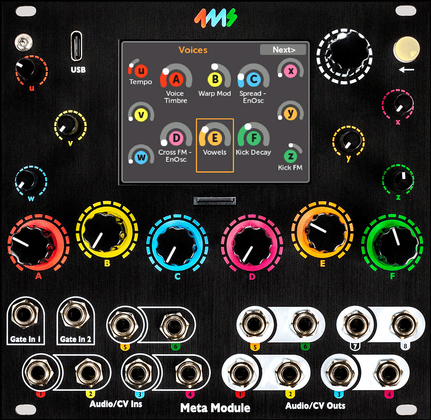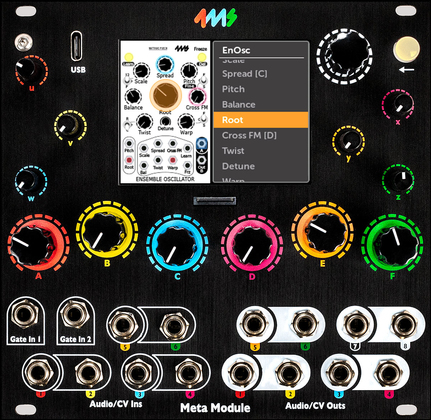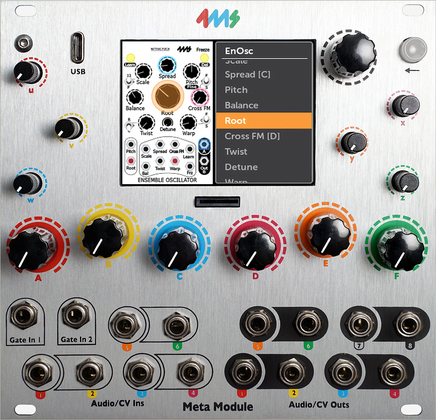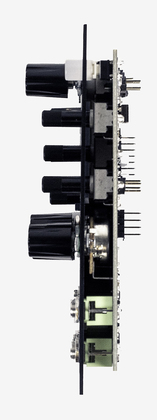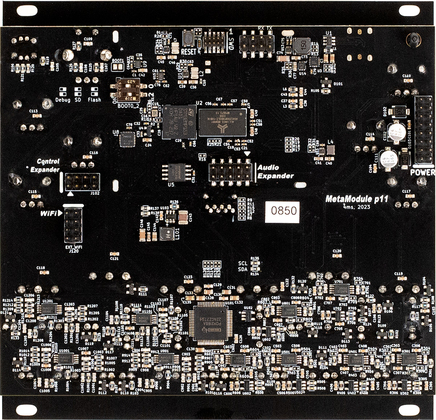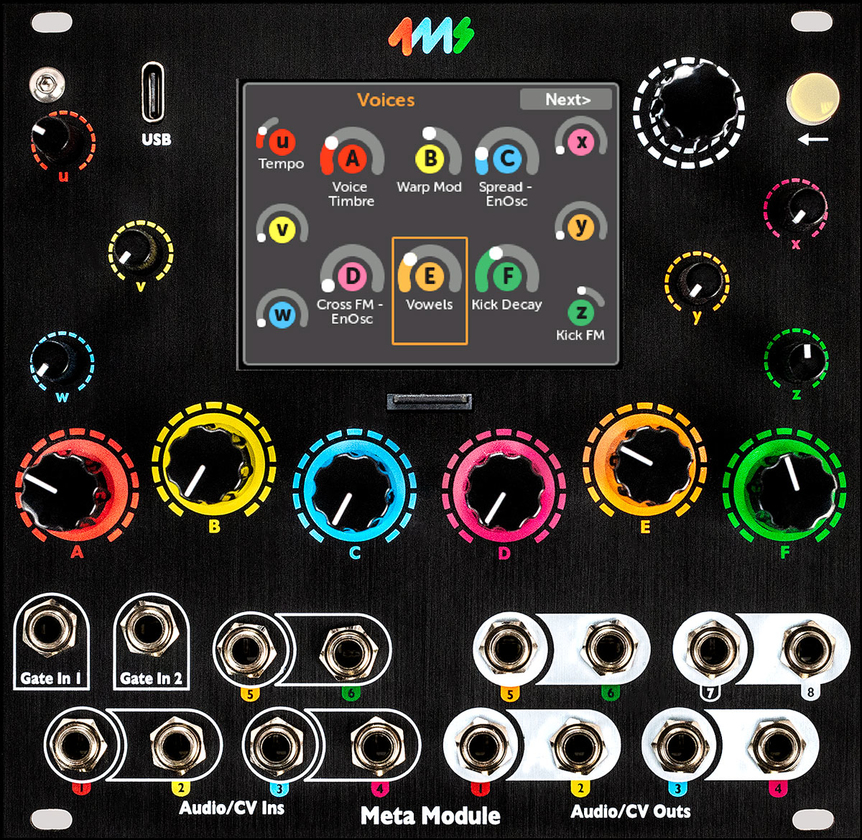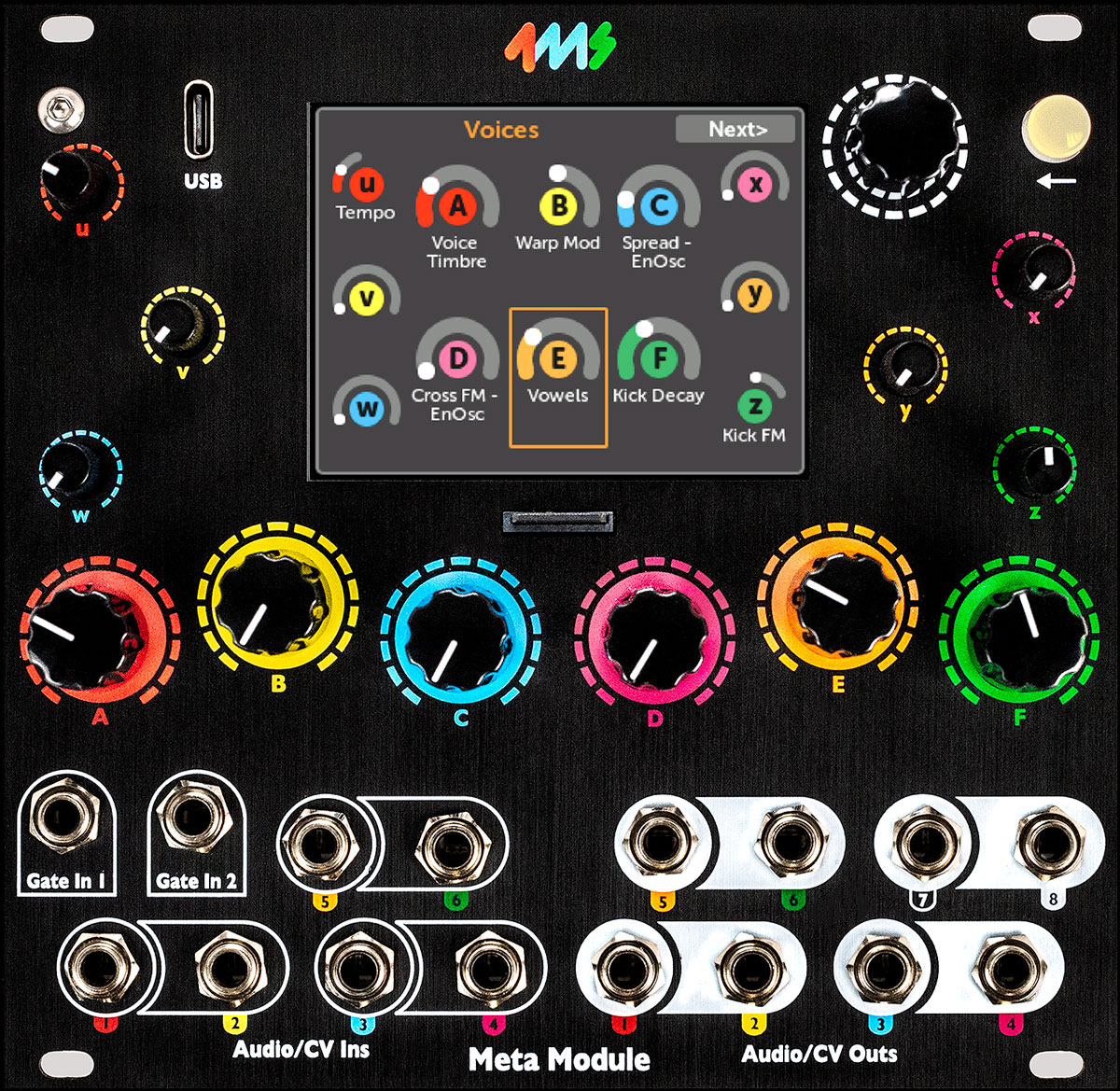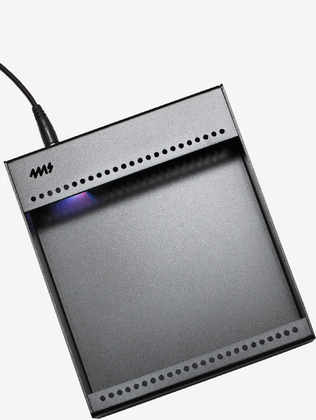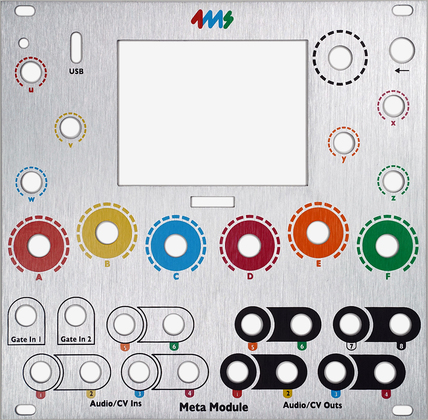| MetaModule [META] |
The MetaModule puts real knobs and jacks on virtual software modules. Step back from the computer and make music with hardware, while keeping the flexibility and expandability of software.
The MetaModule comes with hundreds of built-in modules from 4ms Company, Befaco, HetrickCV, NonlinearCircuits, and Scanner Darkly, plus clones of popular classics such as the Mutable Instruments eurorack modules, fun physical modeling algorithms, and lots of handy utilities, with the ability to add hundreds more via plugins (over 1,600 virtual modules are available as of early 2026).
All of the included modules are also available on the computer using the free program VCV Rack. Whether you make patches on VCV Rack and transfer them to the MetaModule, or if you just create patches directly on the MetaModule, there are plenty of creative modules to inspire new ways to make music.
Info, plugins, manual, and more: metamodule.info
Available now!
MetaModule ships with a black anodized aluminum front panel, but an alternative silver aluminum panel is available separately.
Info, plugins, manual, and more: metamodule.info
MetaModule Plugins
If the 160+ built-in modules aren’t enough, you can load more modules as plugins. Already there are over 1,500 modules in third-party plugins from Bogaudio, Valley, ChowDSP, NANO Modular, and the list is growing. You can use our Module Finder utility to browse and search. We have an SDK available to make it easy for VCV Rack plugin developers to convert their plugin to a MetaModule plugin. Our licensing terms are non-restrictive: developers are welcome to distribute their plugin in any way they wish, commercially or not.
Mapping Knobs and Jacks
The MetaModule has 12 knobs that can be mapped to virtual knobs. Each knob can be mapped to up eight virtual knobs, and each mapping can have a different range and offset. You also can save a group of mappings as a Knob Set and switch between Knob Sets with the encoder. You also can map the 8 inputs and 8 outputs to virtual module jacks. Also, the MetaModule is a USB MIDI host, so you also can map MIDI CC, note, gate, and other parameters to knobs and jacks.
Expanders
There are lots of ways to customize your MetaModule. A Wi-Fi Expander allows you to wirelessly transfer patches from your computer. Add eight more knobs with the forthcoming Knob expander, or buttons with the Button expander. A CV/Audio expander adds more high-resolution inputs and outputs, and a future TRS MIDI input and output expander for MetaModule will be available later in 2026.
Under the Hood
There are six CV/Audio inputs, two gate inputs, and six CV/Audio outputs. The CV/Audio jacks are all 24-bit, 48kHz DC-coupled, -10V to +10V. A USB-C jack accepts MIDI devices and thumb drives. Patches and plugins can be loaded via a USB drive or microSD Card, and internal flash memory lets you save patches you always want to come back to.The processor is more advanced than anything 4ms has used in the past, and is among the most powerful processors found in Eurorack. Startup time and latency are blazingly fast.
Modules
- 160+ built-in modules
- Over 1,600 3rd-party module plugins available so far, and the ecosystem is growing
- Create patches using VCV Rack or directly on MetaModule
Patches
- Patches are loaded from microSD Card, USB drive, or via the Wifi expander
- Patches can be optionally saved onto internal flash memory
- Create patches using VCV Rack or directly on MetaModule
- Patches can be given a name and description
Mappings
- Map each physical knob to up to 8 virtual knobs
- Set range and offset for each mapping, including inverted control
- Knob mappings are grouped into Knob Sets, and changing Knob Sets can be done quickly without menu-diving
- Map physical jacks to virtual jacks, seamlessly making splits/mults
- Add or edit modules, cables, and mappings in real-time while the patch is playing
- Create alias names for mappings like "Kick Drum Level"
Interface
- Simple, intuitive graphical interface lets you zoom in on details, or zoom out to get a big picture
- Patch View displays the patch as faceplates and cables, with knobs, buttons, and lights animating in real-time
- Knob Set View simplifies the display, showing only the mapped knobs for the current Knob Set
- Module View shows just one module and lists the names of each jack, knob, and control legibly
- Mapping View lets you adjust details of a knob mapping
- Adjust styles and visual preferences to your liking
- Save, rename, duplicate, and delete patches
- Firmware updater and plugin loader read from microSD Card or USB drive
Hardware
- 12 Knobs
- 8 CV/Audio outputs, 24-bit 48kHz, -10V to +10V, DC-coupled
- 6 CV/Audio inputs, 24-bit 48kHz, -10V to +10V, DC-coupled
- 2 Gate inputs
- USB-C jack: MIDI Host or MSC (External drive) Host
- microSD Card slot
- Internal Flash RAM for additional patch storage
- Dual-core 800MHz Cortex-A7 plus Cortex-M4 co-processor
- 512MB DDR3 533MHz RAM
- Bare-metal operation for fast startup and low latency
- 26hp
- Depth: 25mm
- Power consumption
- +12V: 290mA maximum
- -12V: 40mA maximum
- +5V: (not used)

